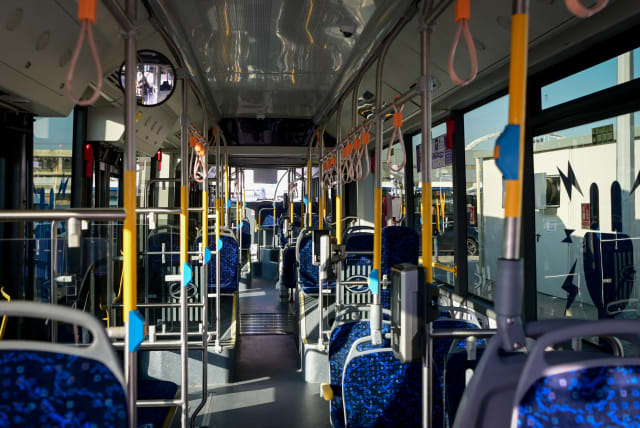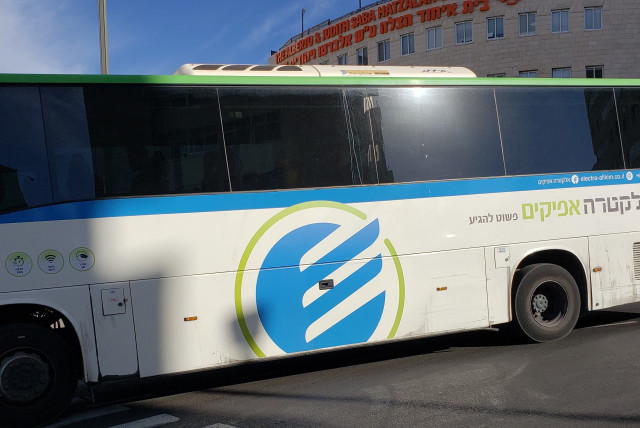Stop allowing Israeli buses to be unsafe for women - editorial

Public transit is a basic right and no one should feel unwelcome, uncomfortable, or unsafe boarding a bus in Israel. The ban on gender segregation and harassment must be enforced.
The harassment of women on public transport entered the spotlight earlier this week after three incidents of discrimination caught the public’s attention all on the same day.
The first instance was experienced by a group of teenage girls who were told by the driver of an Ashdod bus that they had to cover up their arms and legs and were instructed to sit at the back of the bus.
Shortly after, a woman trying to board an Electra-Afikim bus, also in Ashdod, was told that the public transport line was “only for men.”
Finally, a bus driver in Ramat Gan refused to answer a question asked by a female passenger, instead telling her husband that he “doesn’t talk to women.”
The three incidents drove both Prime Minister Benjamin Netanyahu and Transportation Minister Miri Regev to issue condemnations, with Netanyahu reiterating that “the State of Israel is a free country, where no one can limit who gets on public transportation and no one can dictate where she or he sits. Whoever does this is breaking the law and should be punished for it.”
Israeli buses have a long history of discrimination against women
The phenomenon of discriminatory behavior against women and illegal gender segregation on public transport is not new. Back in May, the first instance of a teenage girl being banned from boarding an Electra-Afikim 80 bus in Ashdod was recorded.
At the time, Electra-Afikim released a statement saying it did not operate any bus lines exclusively for men, but despite this, the driver insisted that the route 80 bus was in operation solely to transport haredi students to and from yeshiva.
Both the act of declaring a public transport line to be exclusively for one gender and forcing women to sit at the back of the bus were outlawed by the High Court of Justice in 2011, a decision that was met with outrage by ultra-Orthodox communities at the time.
Since the ban, certain bus lines operating in haredi neighborhoods have continued to operate with unofficial gender segregation enforced by the communities themselves, with women boarding and sitting at the back of the bus.
However, despite the supposed self-enforced nature of gender segregation and the signs on buses reaffirming that passengers may sit anywhere on the bus that they wish, incidents such as the ones that occurred earlier this week continue to crop up, and even appear to be on the rise.
These instances seem to point to the fact that while the High Court ban is still in effect on paper, it is no longer being enforced, and there may even be very little desire to enforce it.
Despite bus companies saying they don’t support the actions of the drivers in question, these acts of discrimination continue to happen, indicating that whatever steps the companies are taking to put an end to it are simply not enough.
And while the bus companies do have to take responsibility and try to enact change, the root of the problem may be found higher up the chain of command, in the Transportation Ministry itself.
Although Regev spoke out against the actions of the bus drivers, her deputy, Uri Maklev of United Torah Judaism, has done the opposite, and has spoken in favor of reinstating the legislation to operate gender-segregated bus lines, saying in 2020 that women would actually benefit from it.
To ensure that these acts of discrimination are put to an end, and that no more young women are called “naked” or told that they “need to put on a shirt” before getting on the bus, the Transportation Ministry must issue a clear condemnation of the events and directives to prevent future instances.
The ban on gender segregation must be properly enforced. Bus drivers must prevent passengers from harassing women for the way they’re dressed, bus companies must take action against drivers who refuse to let women board, and the Transportation Ministry must crack down on bus companies, putting an end to the self-imposed segregation.
Public transit is a basic right and no one should feel unwelcome, uncomfortable, or unsafe boarding a bus in Israel.
Jerusalem Post Store
`; document.getElementById("linkPremium").innerHTML = cont; var divWithLink = document.getElementById("premium-link"); if (divWithLink !== null && divWithLink !== 'undefined') { divWithLink.style.border = "solid 1px #cb0f3e"; divWithLink.style.textAlign = "center"; divWithLink.style.marginBottom = "15px"; divWithLink.style.marginTop = "15px"; divWithLink.style.width = "100%"; divWithLink.style.backgroundColor = "#122952"; divWithLink.style.color = "#ffffff"; divWithLink.style.lineHeight = "1.5"; } } (function (v, i) { });

